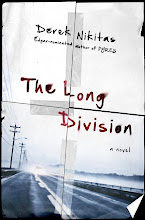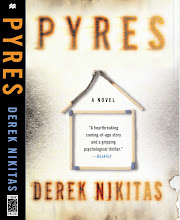Some readers like relatively plot-light, lyrical novels. They are often forced to defend their taste against the backlash: boring, self-indulgent, too distracting from the "story." A common defense: "I read it for the language."
How I wish apologists of lyrical fiction would stop saying "I read it for the language." It ain't helping the cause. Why? Because people don't really know what "for language" means. Especially those who say it. Which makes the idea too easy to dismiss as elitist or pedantic.
Come on: nobody reads novels for the language. That's like saying you eat at fancy restaurants for the calories or look at paintings for the paint. Written language is just utterances, denoted by letters, formed into words printed on a page. Yes, there's a certain musicality in well-formed utterances, but that musicality isn't the bottom-line reason we read novels, no more than the pleasantly musty smell of library books is the reason. Who would read novel after novel by the same author only because he likes the way the author makes noises?
Language poets write a kind of verbal poem that lacks any semantic meaning. Language poetry is largely performative and mercifully short in duration, and almost nobody gives a damn about it, except perhaps truly pretentious people. If you're truly in that camp, then congratulations for existing in a higher state of consciousness and aesthetic sensitivity than the rest of us philistines.
But I'll assume most of us, including those who claim to love language, aren't that detached. Even the briefest, most lyrically rich poem we read for more than mere language. And a whole novel? Come on.
So what do we really mean when we say we love lyrical novels for the language? (to be continued)


2 comments:
Okay, maybe you only read books with exotic settings or colorful characters or something. Fine. But why go beyond your own experience and claim that no one reads lyrical novels for language? Also, did you intend to assert that musicality is the only trait of pleasing language? What an odd, indefensible position! What a weird blog!
I'm not--I hope--asserting that people don't read "for language." What I'm asserting here is that the term "for language" does not adequately convey the rich and complex set of reasons behind what people more likely mean when they use that phrase, "for language." I'm actually defending such folks against people who think they're elitist or crazy. I discuss musicality in this particular blog entry, but there are two others in the series (Pt 2 and 3) that discuss imagery and sentiment, two other more precise (and, I think, correct) ways of approaching the "language" issues. There are even more, of course, which simply shows how limiting the term "for language" is. Thanks for reading.
Post a Comment